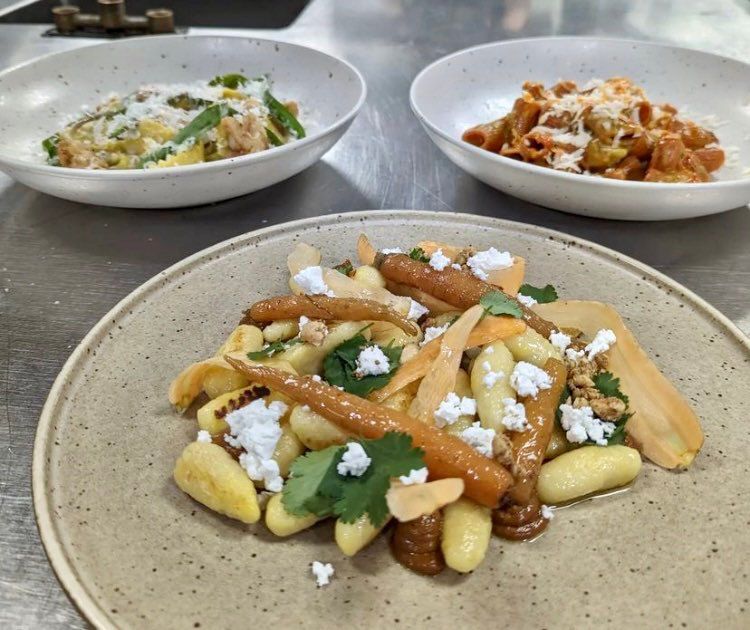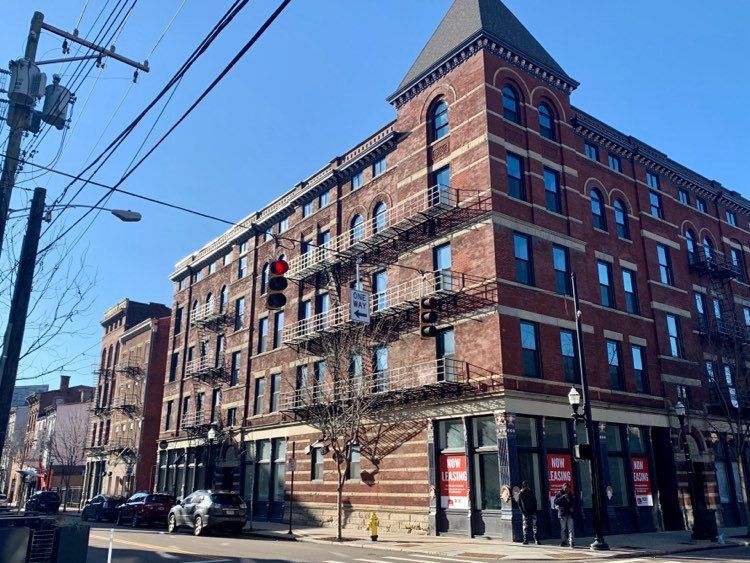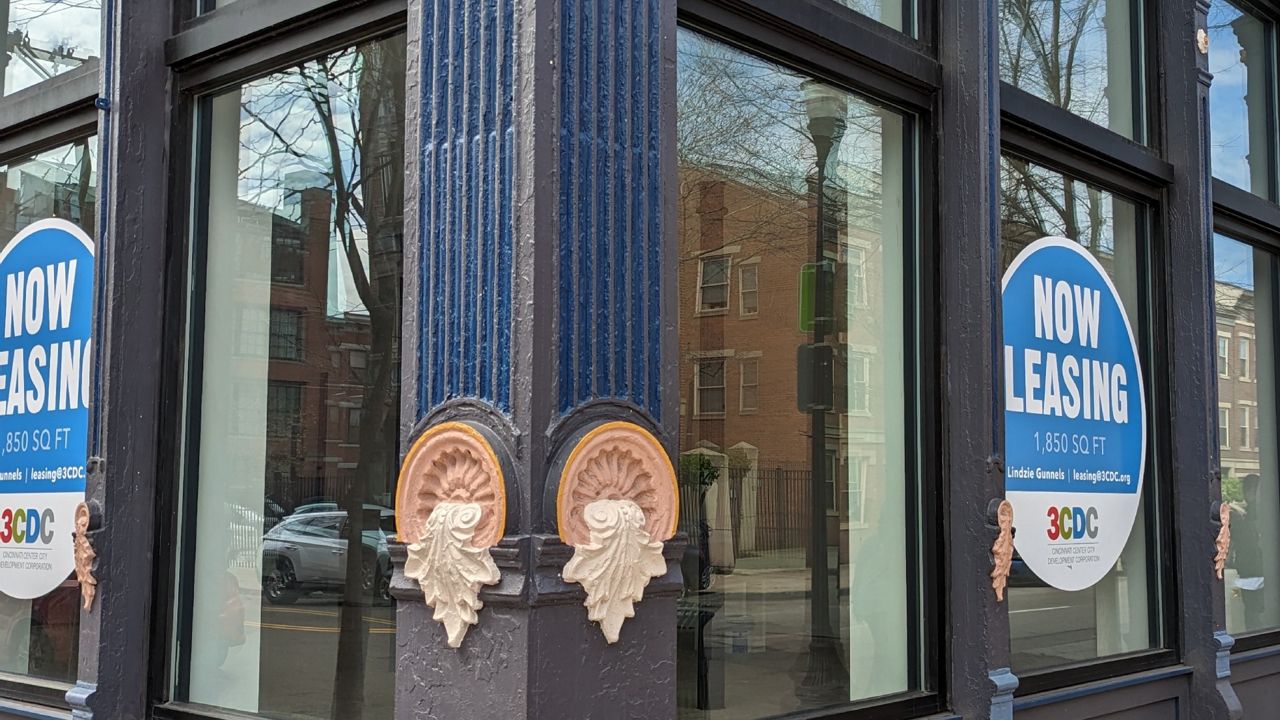CINCINNATI — Chef David Jackman honed his skills working in some of the most reputed kitchens in the world. He’s worked under the tutelage of culinary stars in Michelin star restaurants in San Francisco, Vancouver, Nashville and New York City.
But Jackman credits the past four-and-a-half years of operating a pop-up eatery with his wife in Cincinnati as the reason he’s ready to open a full-time restaurant in Over-the-Rhine this fall.
What You Need To Know
- After more than four years as a pop-up concept, Wildweed is set to become a full-time Over-the-Rhine restaurant this fall
- The Ohio Restaurant Association views pop-ups as a low-risk way for a chef to develop an audience
- The Jackmans expect long hours, but they feel ready for the challenge
The couple’s pasta-centric concept Wildweed is moving into a storefront at 1303 Walnut St. as part of Cincinnati Center City Development Corp. (3CDC)’s Columbia Flats project. Lydia, his wife, is going to lead guest relations and day-to-day operations.
Wildweed’s menu aims to “celebrate and showcase” the best cultivated and wild-harvested products in the region, Jackman said. He plans to work closely with local farms and food businesses. There will be pasta dishes, but Jackman stressed it won’t be an Italian restaurant.
“You’re calling the shots,” Jackman, 34, said of his decision to open a permanent Wildweed location.
“Sometimes being a creative, you don’t really want to play in a sandbox when someone else is going to create for you,” he added. “You want to create… your own.”
‘Popping’ into the minds, stomachs of Cincinnati diners
Jackman started Wildweed as a traveling, temporary restaurant in 2019 shortly after moving to Cincinnati from Vancouver to be with his now-wife. She’s also a chef. The couple operated out of Oakley Wines under the name Sunday Sauce.
Over the past four years, it has taken other iterations, including most recently serving as the restaurant-in-residence at the Mighty Good space across from Findlay Market. They’ve operated there on Fridays through Sundays since early March.

Starting in a pop-up location or a residency program isn’t abnormal for restaurants, said John Barker, president and CEO of the Ohio Restaurant Association (ORA). He often suggests prospective restaurateurs take that route.
While a food truck or a food hall may not be as sexy as a built-out, sit-down restaurant, the longtime industry executive described those temporary setups as a great way to “tiptoe into it.”
“Starting a restaurant may sound so simple, but you can’t just say, ‘Hey, my neighbor’s mother really loves the spareribs I make so I think if I open a restaurant, I should easily be able to become a millionaire,’” Barker added. “That’s usually not the case.”
The big difference between going from a pop-up to a 60-odd-seat restaurant is building a team around him. Right now, he and his wife cook most days.
Wildweed plans to host guest chefs to allow his team opportunities to experience food innovations taking place across the country, Jackman said. He sees those as things for attracting and keeping talented cooks and servers.
“With pop-ups, you do most of the work yourself,” Jackman said. “You might add staff here or there to help with final touches, but that’s about it. With a restaurant you know, the difference is, is that you’re building teams of advocates and ambassadors for your concepts.”
‘You’ll spend the most time doing the parts of the job you like least’
Barker stressed the importance of having a well-crafted business plan long before ever serving a single dish.
Not just a menu or maybe a design aesthetics, but something that analyzes data about the neighborhood, diner preferences, anticipated budget, menu pricing and “all the pieces that you’re going to have to deal with” on a day-to-day basis, Barker said.
“The parts of the job you like the least are usually the ones you where you have to spend the most of your time because you’ve got to do it,” Barker said.
While having an established audience is key, all businesses face challenges.
A survey by the National Restaurant Association found that 92% of operators say the cost of food is a significant issue for their business. In 2023, 47% of operators expect competition to be more intense than last year, the data showed.
More than 2,800 restaurants opened in Ohio in the past two years, including 137 in Hamilton County alone.
Jackman has tapped Cincinnati-based Team B to design the looks of his future 1,848-square-foot space.
Wildweed plans to offer what Jackman called multi-tiered dining experience. There will be standard menu items at various price points, he said, but also envisions a separate chef’s counter-tasting experience.
“It has to start with a dream, but it needs to be you need a lot more than just a dream to make it work,” Barker said.
‘Most rewarding hardest thing I’ve ever done’
Wildweed is more than a half year from opening, most likely. But one of its future neighbors, Homemakers Bar, is ready to welcome the Jackmans.
Julia Petiprin, the owner of Homemakers, has been in Jackman’s shoes on more than one occasion.
In her more than 20-year career, Petiprin has worked in most front-of-house roles in the bar and restaurant business — busser, server and bartender. She moved to Cincinnati from Los Angeles in 2015 to help open and co-own her first bar, Sundry and Vice in OTR.
Since then, Petiprin ventured out on her own. She spent about more than a year working with a former business partner to develop a go-to-market strategy. After about eight months of construction, Homemakers opened in June 2019.

“It’s the most rewarding and hardest thing I’ve ever done,” she said of opening a business.
“There are a lot of ambitious people who are looking for forward-career momentum. But they must understand that you’re not just doing a good job and going home,” she added. “It’s working 90 hours a week, taking care of a team. It becomes a huge part of your life.”
Jackman knows what comes next won’t be easy. They’re running their Elm Street residence program through the next few weeks. They also plan to do several events to help promote the new business.
Beyond working long hours, Jackman and his wife also have a young child. Even right now, being present all the time he wants has proven difficult sometimes.
“It’s a difficult balancing act,” Jackman said. He and his wife often must take turns between cooking or going and taking a customer-facing role while carrying for their daughter.
But after 20 years in the business, hesitancy isn’t really part of his vocabulary. Despite what he views as relatively short-term pains, Jackman said he feels things will fall into place once they’re able to hire staff.
“I keep joking that we’re burning the candle at both ends, so when we finally open… it’s going to feel like a 9-to-5 job,” he added.



